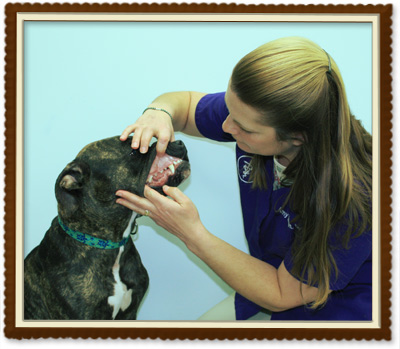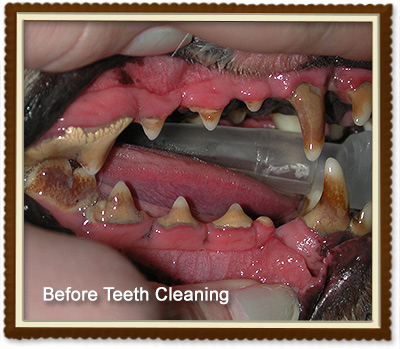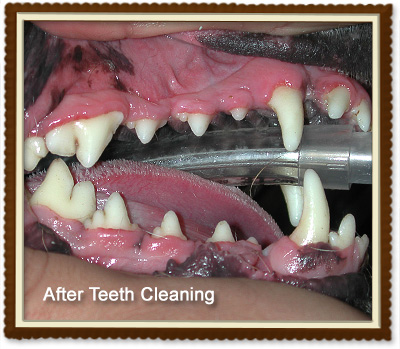Your Pet's Dental Care
 The Importance of Pet Dental Care
The Importance of Pet Dental Care
You are a responsible pet owner. You take good care of your pet. But do you always remember to take care of your pet's teeth?
Pets have dental diseases and problems just like people do. Good dental hygiene improves your pet's health, vitality, and well-being; it can also add additional years to his or her life. If left untreated, dental disease is painful, inhibits proper nutrition, and may lead to serious systemic issues that can threaten your pet's health (before symptoms are even noticeable). For example, oral bacteria that enter the bloodstream can damage your pet's kidneys, heart, or liver. It is estimated that more than 80 percent of dogs and 70 percent of cats develop tooth and gum disease by just three years of age.
Regular dental check-ups and teeth cleanings contribute in a big way to the best quality of life for your pet. Many of these problems can be avoided by bringing your pet to Tower Hill Animal Hospital for regular dental check-ups and dental cleanings.
Signs of Dental Problems
You can prevent serious dental problems from happening by making sure your pet receives dental exams at the time of each vaccination, again at six months of age, and then annually. In between visits to our hospital, check your pet's teeth regularly for signs of problems. Symptoms of dental disease include:
- Bad breath — one of the first signs of dental disease
- A yellowish-brown crust of plaque on the teeth near the gum line
- Red and swollen gums
- Pain or bleeding when your pet eats or when the mouth or gums are touched
- Decreased appetite or difficulty eating
- Loose or missing teeth
Does your pet have bad breath or reddened gums?
If so, gingivitis could be the cause. Gingivitis occurs when soft plaque hardens into rough, irritating tartar. Tartar build-up on your pet's teeth can cause damage to the teeth and gums. If left untreated, gingivitis can lead to an infection called periodontal disease. This disease can cause the loss of teeth.
Your Pet's Dental Cleanings
Dentistry for your pet is quite different from human dentistry. For most of us, caring for our teeth and gums has been part of our daily routine for as long as we can remember. Consequently, a person's visit to the dentist is relatively brief and does not require sedation. In contrast, your pet's dental care is considerably more involved, time consuming, and complex. It requires general anesthesia, a day's hospitalization and, the skills of our entire team.


Pre-Dental Workup
A pre-dental workup involves laboratory and diagnostic tests to better evaluate your pet's current health status and to assure safe anesthesia. Current medical problems must be evaluated and any possible unknown problems must be identified prior to dentistry. For all pets, regardless of age, we suggest a brief in-hospital blood screen on the day of the dentistry. For older animals, a complete blood count (CBC) and blood chemistry profile is performed prior to the dentistry.
Your pet's dental cleaning begins with a physical examination. This is important to evaluate your pet's general health. After the physical exam, your pet is given anesthesia for a safe and painless sleep during the dental cleaning.
The first part of animal dental cleaning requires the removal of tartar. This is done by hand, using tartar forceps. Next, an ultrasonic scaler is used above and below the gumline. Once the teeth have been thoroughly cleaned, a periodontal probe is used to check for pockets below the gumline. Deep pockets can mean periodontal disease and infection. If deep pockets are found they are cleaned by hand using a curette to remove plaque and tartar from the exposed root surfaces. If necessary, dental x-rays are taken to help guide further treatment. Your pet's teeth are then polished, creating a smooth surface. The gums are washed with an anti-bacterial solution to help delay tartar build-up both below the gumline and on the crown of the tooth. Finally, the doctor also administers a fluoride treatment to strengthen your pet's teeth, desensitize exposed roots, and decrease infection.
Home Care and Prevention
Dental care does not end with a visit to Tower Hill Animal Hospital. You need to continue your veterinarian's good work at home. Brushing your pet's teeth is an important part of home dental care. A staff member at Tower Animal Hospital will show you the proper method of brushing your pet's teeth.
Give Your Pet Complete Dental Care
Annual veterinary dental care and home dental care helps keep your pet's breath fresh and gums and teeth healthy. Your pet's smile and healthier life will be matched by your smile and pride in a job well done.